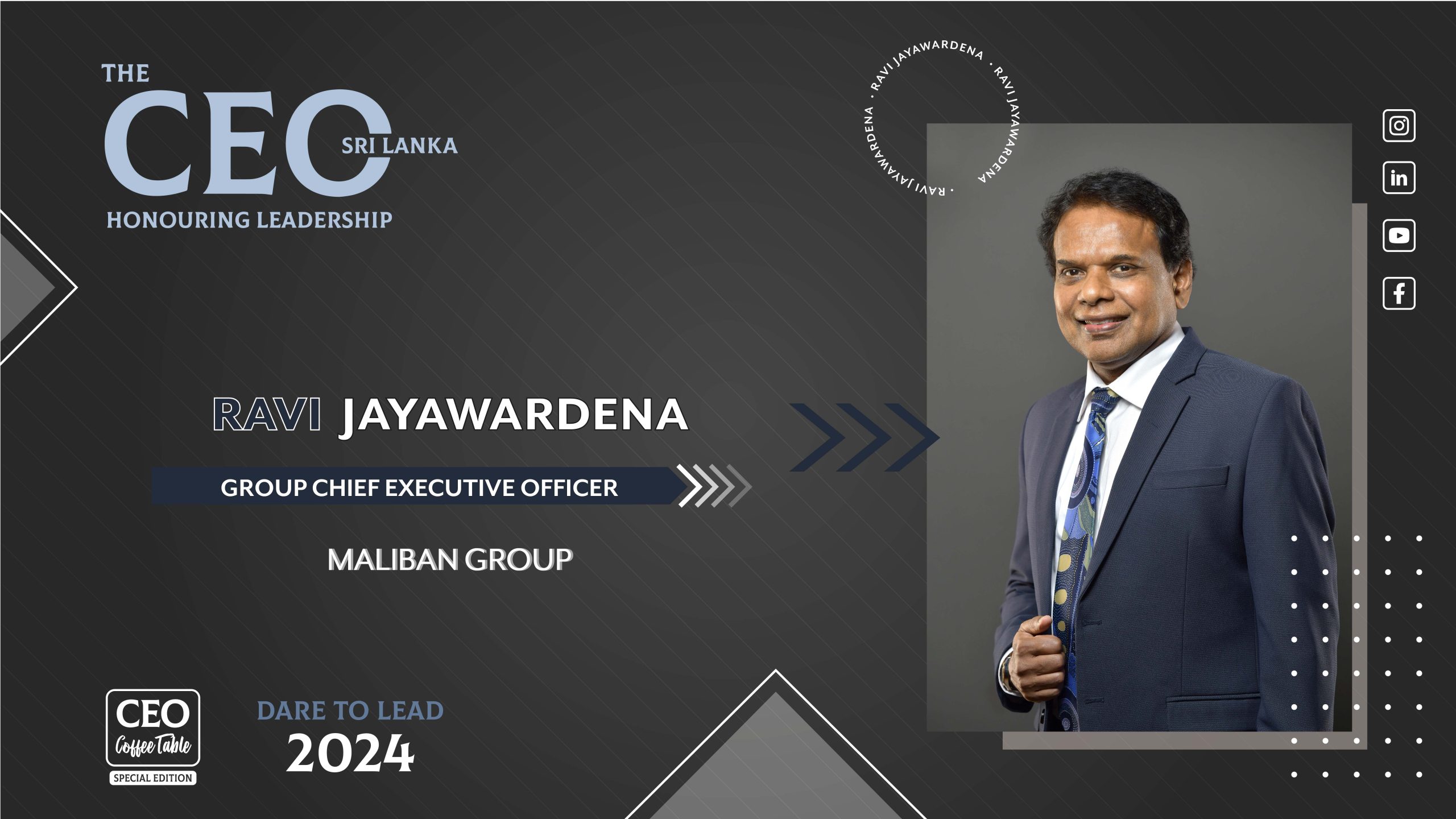Ravi Jayawardena, Group CEO of Maliban Group, is one of the key members of the Maliban core team that drives the company’s strategic agenda. Maliban’s annual turnover is around US 200M and driving a conglomerate like Maliban Group is a very challenging task considering the past few years’ overall micro and macro environmental factors. During the dual crises of the COVID-19 pandemic and the forex crisis, Maliban has demonstrated remarkable resilience. The senior leadership had to make daring strategic decisions to navigate the uncertainties and reshape the group’s strategy. Reflecting on this period, Ravi emphasizes the importance of focusing on controllable factors and putting hundreds of percent of energy behind those to be right on top. To have transparent communication across management layers’ the company introduced a new concept “Let’s Talk” a town hall-type gathering to facilitate transparent two-way communication. This overall approach proved vital in sustaining operations and ensuring business continuity.
On the business sustainability front, Maliban has achieved carbon neutrality and upheld high product standards despite economic challenges. Furthermore, his focus on blending youthful talent with experienced leadership has fostered a culture of excellence and adaptability, positioning Maliban for sustainable success and on the route to global prominence.
Throughout this period, Ravi with the guidance of the newly appointed Chairperson Ms. A.G. Kumudika Fernando, and the Board of Directors maintained a strong emphasis on the well-being and satisfaction of Maliban’s employees. Despite challenging economic conditions, the company did not lay off a single employee. It even increased its overall income by offering additional financial support, contributing to higher revenue and job satisfaction. This focus on people has been pivotal, ensuring that the workforce remained motivated and committed. As a result, Maliban has won in two consecutive years “a great place to work” title. The company’s profitability through the stretch remained steady, showcasing the effectiveness of its strategies. By fostering a culture of teamwork and equitable contribution across management layers, the Maliban Group navigated the crises successfully, laying a strong foundation for future growth and regional expansion.
Inspired by the Chairperson’s vision, Ravi and his core team focus on global expansion and innovation initiatives to expand beyond Sri Lanka’s saturated market by forging a strategic partnership with the internationally renowned Reliance Group, the largest retailer in India. Recognizing that the local market, with its twenty-two million people and around thirty-five manufacturers of biscuits, had limited growth potential, they embarked on a journey to tap into India’s vast consumer base. Maliban underwent rigorous quality testing by Reliance, competing against seven brands, including three major Indian brands and two international ones. Emerging as the top brand with the highest rating in quality in these tests, Maliban began its journey with strategic partner Reliance Retail in India. Currently, Maliban Biscuits has expanded into Bangalore and Chennai, with plans to scale up significantly. This move aimed at increasing their market reach to a level in time to come where potentially Sri Lanka’s annual sales could be matched in a single month in India. Ravi’s strategic intent for Maliban is ambitious, to strive to establish the brand among the top ten confectionery brands globally within the next five to seven years.
Driving innovation with sustainable growth has been the cornerstone of Maliban’s growth strategy. One bold initiative was embedding a continuous innovation mindset across the company, particularly focusing on evolving consumer habits. In the post-COVID era, there was a noticeable shift toward health and wellness products, for example, consumers seeking products with less sugar and salt. Recognizing this trend and led by the Chairperson’s comprehensive effort to align Maliban’s product offerings with emerging consumer preferences, health, and wellness initiatives were driven across biscuits, milk, and even their newly acquired bakery line Little Lion, which is now under Maliban’s umbrella. To name a few, Maliban introduced new to-the-country products (30% less sugar range), world-class Digestive biscuits, and a Chocolate-coated range under the Zellers brand name. Furthermore, due to low disposable income consumers are looking for ‘value for money’ products hence the R&D team is working very effectively to cater to this substantive consumer sector as well.
As everyone is aware, the DNA of Maliban biscuits is of exceptional quality. It has been maintained during the last seven decades by the legendary founder the late Mr. A.G. Hinniappuhamy. It was followed and strengthened by the founder’s son Mr. A.G. Ratnapala Samaraweera and is now driven with renewed vigour by the current Chairperson Ms. A.G. Kumudika Fernando, the granddaughter of the founder. Ravi emphasized that the main custodian of innovation is the Chairperson backed by the integrated marketing and quality teams. The marketing team played a pivotal role in understanding consumer dynamics and translating them into new product development concepts which were converted into tangible products by the R & D/Quality teams. By continuously engaging with consumers and identifying their needs, Maliban’s R&D team has developed products that resonate well with the market. A prime example of this consumer-centric innovation is Maliban’s high-fiber digestive biscuit, which has been lauded for its quality and mouth feel. This product, developed based on consumer feedback, quickly became a benchmark for excellence in its category, showcasing Maliban’s commitment to quality—a core value deeply ingrained in the company’s DNA.
To inspire the Maliban team to embrace this vision, the company has cultivated a culture of inclusivity and recognition, ensuring every team member, from the chairperson to factory workers, feels equally important and valued. This approach fostered a sense of unity and collective responsibility, driving the team to work towards common goals. The outcomes of this innovation-driven strategy resulted in Maliban’s new product success rate exceeding industry standards, validating the effectiveness of its rigorous innovation processes. By staying attuned to consumer needs and maintaining an unwavering focus on quality, Maliban navigated the challenges of the changing market and set the stage for sustained growth and leadership in the food sector.
Integrating diverse business units under a cohesive strategy has been a significant challenge for the Group CEO. The organization operates across various sectors, including biscuits, dairy, agriculture, and the newly acquired Little Lion, each with distinct operational dynamics and management needs. His approach to this challenge involves a nuanced understanding of the group’s structure and implementing a flexible, yet cohesive strategy.
The Maliban Group’s structure is somewhat matrixed, with specialized units handling different areas such as production, IT, and HR. For instance, each business unit is led by a Senior General Manager. To ensure alignment across these units, management has focused on streamlining group-wide functions like IT, HR, quality, marketing, and finance, integrating systems and processes where feasible. For example, advancements made in IT within the biscuits division are being cascaded to other SBUs, creating a more unified technological framework across the group.
Given the high span of control and the diversity of the business units, the Chairperson and Ravi have also worked to decentralize some aspects of management. They have appointed different CEOs/Business Unit Heads for various units, such as a dedicated CEO for the Bakery and Cookie sector and a Head of Business for the Agri sector while he remains directly involved with the biscuits and dairy divisions. This approach allows for more focused leadership within each sector while maintaining overall strategic alignment through regular communication and coordination with the group’s senior management team.
Moreover, Maliban has introduced senior finance roles to oversee critical operational areas, such as agribusiness and plantations, ensuring that each business unit is managed effectively while contributing to the group’s strategic goals. The marketing function is similarly structured with a group marketing head overseeing overarching strategies, while individual marketing managers cater to the unique customer dynamics of each business stream.
Through these efforts, Ravi has managed to integrate Maliban Group’s diverse business units into a coherent strategy, balancing specialized operations with overarching group objectives. This approach has facilitated effective management of the group’s varied sectors while driving growth and maintaining alignment with the group’s broader vision.
Maliban has championed ambitious sustainability goals at the Group level, underscoring a commitment to both environmental stewardship and social responsibility. One of the bold initiatives the group has undertaken is achieving carbon neutrality. As the first biscuit factory to obtain carbon certification, Maliban is leading the industry in environmental sustainability. This achievement involved rigorous measurement of carbon emissions and a dedicated effort to mitigate their environmental impact. The group has invested significantly in solar energy, with their Yahaposha factory in Dambulla, generating more energy from solar than it consumes, reflecting a substantial commitment to reducing their carbon footprint. The goal is to achieve the “Carbon Neutrality” status five years down the line.
The company’s approach to sustainability also emphasizes maintaining high-quality products despite challenging economic conditions. When the value of the dollar appreciated, Maliban made a conscious and time-tested decision not to compromise on the quality of raw materials, even though this meant higher costs and erosion of margins. This decision underscores the company’s dedication to social responsibility by ensuring that high standards are upheld, demonstrating a commitment to delivering quality products without taking commercial shortcuts.
In addition to these environmental and quality-focused initiatives, the Maliban Group has made substantial investments in employee welfare. During the COVID-19 pandemic, the company went above and beyond, spending approximately 30 million a month to protect and support its workforce. This included setting up a dedicated hospital for employees and obtaining the SLSI certification for food safety, making Maliban one of the few manufacturers to receive such recognition during the pandemic. The leadership team has balanced these ambitious sustainability and social responsibility goals with the group’s financial objectives, ensuring that the company’s commitment to environmental and social issues does not compromise its financial health. This holistic approach to sustainability integrates environmental stewardship, product quality, and employee welfare, setting a high standard for corporate responsibility.
Ravi has placed a strong emphasis on personal development, particularly in talent management. Recognizing the importance of building a robust leadership pipeline, he has focused on strengthening the bench strength of the organization. He observed that the previous senior management team was ageing and took proactive steps to infuse the group with younger talent. Today, key positions such as Head of IT, Head of Marketing, and Head of Sales are occupied by individuals in their 30s and 40s, representing a dynamic mix of youth and experience. This strategic shift has not only revitalized the leadership team but also positioned Maliban for future growth and innovation.
His commitment to personal development extends beyond merely hiring young talent; it also involves nurturing and developing this talent into effective leaders. He has implemented a leadership forum within the company, selecting 30 promising individuals to participate in advanced leadership programs. These initiatives aim to bridge the gap between good managers and exceptional leaders by focusing on soft skills, emotional intelligence, and team management. Ravi’s approach reflects his belief that leadership can be cultivated rather than being an innate trait, emphasizing the importance of grooming individuals to become well-rounded leaders who can drive the company forward.
Furthermore, his journey of self-improvement has influenced his leadership style by underscoring the need to balance technical expertise with a positive attitude. Drawing from his experience on the boards of PIM and Cargill’s Bank, Ravi stresses the significance of hiring individuals with the right attitude, as this often outweighs mere qualifications and experience. He believes that a positive attitude and strong interpersonal skills are critical to creating a motivated and effective team.
By focusing on both product and people development, Ravi has ensured that the Maliban Group continues to thrive fully in line with the Chairperson’s vision, inspired by seven decades of entrepreneurial excellence. His approach has led to a more agile and capable leadership team, capable of adapting to market changes and driving the company’s strategic objectives. This dual focus on talent and innovation has been instrumental in advancing Maliban’s mission to put the company on the global map, demonstrating the company’s commitment to both personal growth and organizational excellence.


